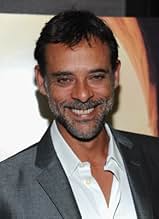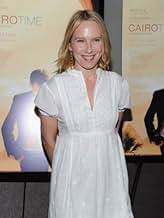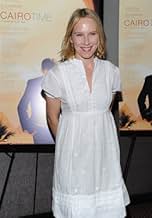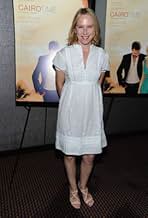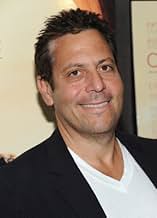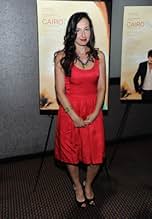Ajouter une intrigue dans votre langueA romantic drama about a brief, unexpected love affair that catches two people completely off-guard.A romantic drama about a brief, unexpected love affair that catches two people completely off-guard.A romantic drama about a brief, unexpected love affair that catches two people completely off-guard.
- Réalisation
- Scénario
- Casting principal
- Récompenses
- 2 victoires et 2 nominations au total
Mohamed Abdel Fatah
- Customs Officer
- (as Mohammed Abdel Fattah)
Avis à la une
Québécois writer and director Ruba Nadda favors stories that deal with love between Muslim and non-Muslim and her latest film CAIRO TIME follows that path - to an extent. According to Nadda she views this film as a 'luscious, serene, languid romance', a story that crosses two unlikely and emotionally unavailable people who approach momentary bliss in the beauty of Cairo. It is a slow film, the type of movie that encourages the viewer to sit back and enjoy an adult romance.
Juliette Grant (Patricia Clarkson) arrives in Cairo for a vacation with her UN employee husband Mark (Tom McCamus) only to discover that Mark is in Gaza on 'business': she discovers the information from a retired ex-assistant to Mark, Tareq Khalifa (Alexander Siddig), who offers her honest companionship until Mark returns. Tareq now owns a coffee house and spends his days playing chess. Juliette meets Kathryn (Elena Anaya), another associate of Mark, who offers her company, but Juliette prefers to be alone. The magic of Cairo - the smells, the muezzin calls to worship, the street shops, the sunsets - all begin to work on Juliette's lonely mood and she wanders into the city, fends off young men's attentions, and encounters Tareq in his coffee house (a men only club). Tareq offers to show her Cairo, especially the pyramids, but Juliette says she promised Mark to share those with him. A trip down the Nile and walks in the fascinating city draw Juliette and Tareq together, and when the two encounter Yasmeen (Amina Annabi), a friend and ex-lover of Tareq, the two are invited to Yasmeen's daughter's wedding in Alexandria. Telephone calls from and to Mark reveal that Mark will be delayed in Gaza, and after Juliette makes an attempt to travel to Gaza to see Mark and is prevented by the military she returns to Cairo, determined to make the best of her extended stay there. She goes to Alexandria with Tareq, they enjoy the wedding, and when they return to Cairo they mutually decide to visit the pyramids. The magic is there and the longing between them is palpable, but as soon as they return, Mark appears at the hotel. The Cairo time is over and the viewer is left guessing how the emotions generated by the time and place will play out.
Among the many lovely details of this film are views about the gender barriers in the Middle East and the customs of a city that, while modern, is still a culture of men. As Juliette and Tareq wander the streets of Cairo we recognize subtleties that exist, subtleties that director Nadda never forces. The gorgeous cinematography is by Luc Montpellier and the musical score is by Niall Byrne. This film is more a poem than a story, a welcome change from the usual youngster-oriented love stories and more of a mature episode of ageless flirtation. Grady Harp, August 10
Juliette Grant (Patricia Clarkson) arrives in Cairo for a vacation with her UN employee husband Mark (Tom McCamus) only to discover that Mark is in Gaza on 'business': she discovers the information from a retired ex-assistant to Mark, Tareq Khalifa (Alexander Siddig), who offers her honest companionship until Mark returns. Tareq now owns a coffee house and spends his days playing chess. Juliette meets Kathryn (Elena Anaya), another associate of Mark, who offers her company, but Juliette prefers to be alone. The magic of Cairo - the smells, the muezzin calls to worship, the street shops, the sunsets - all begin to work on Juliette's lonely mood and she wanders into the city, fends off young men's attentions, and encounters Tareq in his coffee house (a men only club). Tareq offers to show her Cairo, especially the pyramids, but Juliette says she promised Mark to share those with him. A trip down the Nile and walks in the fascinating city draw Juliette and Tareq together, and when the two encounter Yasmeen (Amina Annabi), a friend and ex-lover of Tareq, the two are invited to Yasmeen's daughter's wedding in Alexandria. Telephone calls from and to Mark reveal that Mark will be delayed in Gaza, and after Juliette makes an attempt to travel to Gaza to see Mark and is prevented by the military she returns to Cairo, determined to make the best of her extended stay there. She goes to Alexandria with Tareq, they enjoy the wedding, and when they return to Cairo they mutually decide to visit the pyramids. The magic is there and the longing between them is palpable, but as soon as they return, Mark appears at the hotel. The Cairo time is over and the viewer is left guessing how the emotions generated by the time and place will play out.
Among the many lovely details of this film are views about the gender barriers in the Middle East and the customs of a city that, while modern, is still a culture of men. As Juliette and Tareq wander the streets of Cairo we recognize subtleties that exist, subtleties that director Nadda never forces. The gorgeous cinematography is by Luc Montpellier and the musical score is by Niall Byrne. This film is more a poem than a story, a welcome change from the usual youngster-oriented love stories and more of a mature episode of ageless flirtation. Grady Harp, August 10
Very well-cast crew. Incredibly perceptive and observant director. Took me back to Cairo. Alexander Siddiq is so cute in this movie. Its good to see a movie that does not follow the typical Hollywood American action crap with a climax and a happy ending.
This movie in my opinion was not a typical movie with a plot but more like a trip to Cairo. A sweet memorable trip very identical to my trip and experience there last year, minus the lovely Alexander..
Well done Rubba. Keep them coming... wouldn't mind watching a Granada time or Barcelona time..Beirut time or Istanbul or Kathmandu time...if u can do the same thing with those cities, u'r my hero...
This movie in my opinion was not a typical movie with a plot but more like a trip to Cairo. A sweet memorable trip very identical to my trip and experience there last year, minus the lovely Alexander..
Well done Rubba. Keep them coming... wouldn't mind watching a Granada time or Barcelona time..Beirut time or Istanbul or Kathmandu time...if u can do the same thing with those cities, u'r my hero...
I've known Alexander Siddig from playing Dr. Bashir on "Star Trek; Deep Space Nine". I've seen Patricia Clarkson in "Jumanji" and "Vicky Christina Barcelona". Both these two actors unite to give us a very touching love story set in the background of Cairo.
Egypt is a timeless land that has had history's touch upon it even as it enters the new millennium. People's lives are bound to the countryside as well as the old cities modernized with technology. Ruba Nadda, a young Canadian film maker, has set her newest story in the city of Cairo. It concerns the clash of two very different cultures, and how the past and present collide to form such a layered city as Cairo. As well as showing us wonderful scenes within the city, we are given exceptional cinematography of the surrounding countryside. The White Desert and the Pyramids stand out, etched out in the land, seemingly by giants who preceded modern civilization.
The film follows Juliette, a middle-aged woman arriving in Egypt. She would have been with her husband, but he is away on a mission for the UN. Her two children have grown up and have moved into adult phases of their lives. She is left to see the city by herself, aided by an old friend of her husband's: the middle-aged Egyptian Tariq, a retired policeman who now owns a coffee shop in Cairo. He helps Juliette out of his friendship to the absent Mark, and Juliette is intrigued by this soft-spoken man. Their feelings inevitably grow into affection, but the gradual steps taken to that stage is what makes the movie so tender and well made. Juliette's explorations of Cairo and the people that live within its shadow give us a view into the foreign culture that lies waiting to be discovered.
If Juliette must carry the movie, she is supported by some well-made characters. Tariq is clearly the prominent of these, but there is also Yasmeen, the former love interest of Tariq who wants to rekindle the relationship, and Kathryn, a kindly woman who leads Juliette on a trip in the White Desert outside of the city. And of course, there is the ever absent Mark, who is continually held away from his wife.
To say that this is a sentimental piece that tugs on heart-strings is redundant. However, it has a life of its own beyond the stereotypes of the genre, brought about by the fantastic chemistry between Patricia Clarkson and Alexander Siddig. The two of them are professional actors and give us a love story that rivals the epic romance "Out of Africa" or the low-key "Lost in Translation".
Ruba Nadda also provides us with a well-written script that feels natural to the actors' tongues and the audience's ears. The mood of the film seems whimsical and light-hearted, especially during the scenes between the two leads, but there is a serious undertone played into the film. Questions are silently presented, aimed against such themes as love, fidelity, culture, and loneliness. Both characters are certainly lonely: Tariq has isolated himself from those that loved him, withdrawing into a kind of politeness that seems to discourage intimacy, while Juliette is isolated from her friends, her work, children, and her husband. Both need human contact, even as both must come to terms with their lives and what has come out of it all.
This small Canadian production has received a number of positive reviews, and has also won the Best Canadian Feature Award at the Toronto Film Festival. While I have certainly not seen all the Canadian films this year, I can definitely say that this was worthy of such an award. English Canadian cinema is so over-shadowed by Hollywood that one wonders if such cinema exists when compared to Quebec's film industry. However, once in a while, one can find such gems as this production, and be content to know that being Canadian means laying claim to truly great films such as this one.
Egypt is a timeless land that has had history's touch upon it even as it enters the new millennium. People's lives are bound to the countryside as well as the old cities modernized with technology. Ruba Nadda, a young Canadian film maker, has set her newest story in the city of Cairo. It concerns the clash of two very different cultures, and how the past and present collide to form such a layered city as Cairo. As well as showing us wonderful scenes within the city, we are given exceptional cinematography of the surrounding countryside. The White Desert and the Pyramids stand out, etched out in the land, seemingly by giants who preceded modern civilization.
The film follows Juliette, a middle-aged woman arriving in Egypt. She would have been with her husband, but he is away on a mission for the UN. Her two children have grown up and have moved into adult phases of their lives. She is left to see the city by herself, aided by an old friend of her husband's: the middle-aged Egyptian Tariq, a retired policeman who now owns a coffee shop in Cairo. He helps Juliette out of his friendship to the absent Mark, and Juliette is intrigued by this soft-spoken man. Their feelings inevitably grow into affection, but the gradual steps taken to that stage is what makes the movie so tender and well made. Juliette's explorations of Cairo and the people that live within its shadow give us a view into the foreign culture that lies waiting to be discovered.
If Juliette must carry the movie, she is supported by some well-made characters. Tariq is clearly the prominent of these, but there is also Yasmeen, the former love interest of Tariq who wants to rekindle the relationship, and Kathryn, a kindly woman who leads Juliette on a trip in the White Desert outside of the city. And of course, there is the ever absent Mark, who is continually held away from his wife.
To say that this is a sentimental piece that tugs on heart-strings is redundant. However, it has a life of its own beyond the stereotypes of the genre, brought about by the fantastic chemistry between Patricia Clarkson and Alexander Siddig. The two of them are professional actors and give us a love story that rivals the epic romance "Out of Africa" or the low-key "Lost in Translation".
Ruba Nadda also provides us with a well-written script that feels natural to the actors' tongues and the audience's ears. The mood of the film seems whimsical and light-hearted, especially during the scenes between the two leads, but there is a serious undertone played into the film. Questions are silently presented, aimed against such themes as love, fidelity, culture, and loneliness. Both characters are certainly lonely: Tariq has isolated himself from those that loved him, withdrawing into a kind of politeness that seems to discourage intimacy, while Juliette is isolated from her friends, her work, children, and her husband. Both need human contact, even as both must come to terms with their lives and what has come out of it all.
This small Canadian production has received a number of positive reviews, and has also won the Best Canadian Feature Award at the Toronto Film Festival. While I have certainly not seen all the Canadian films this year, I can definitely say that this was worthy of such an award. English Canadian cinema is so over-shadowed by Hollywood that one wonders if such cinema exists when compared to Quebec's film industry. However, once in a while, one can find such gems as this production, and be content to know that being Canadian means laying claim to truly great films such as this one.
Cairo Time is an exquisite feast for the eyes, ears and eventually, the heart. Ruba Nadda takes us on a tour of Cairo which flows so well because it appears complete even down to such minute details such as showing street children selling bobby pins, a wild motorcycle driver nearly hitting the film's heroine, and Egyptian hit songs playing on a taxi's radio. In contrast with the high energy scenes of Cairo's bustling city life are dreamy, beautifully composed shots of the city's classical architecture, the Egyptian pyramids and The White Desert, all which give the impression that they are frozen in time. But, the time in Cairo Time is hardly stagnant. The film's stunning images, rich music and moving love story about a bored workaholic Canadian married woman whose passion for love and life is awoken by her relationship with a Egyptian man interplay so beautifully that the film appears seamless. Patricia Clarkson (Juliette) and Alexander Siddig (Tareq) convincingly play a couple whose professional relationship transforms into a love relationship over time. Both actors show off their fine acting skills by expressing the characters' love for each other through their subtle uses of body language and eye contact. Each views the other as a kind of "forbidden fruit", yet neither one can hide their desire for the other. The quiet intensity of their passion is almost deafening. Cairo Time works because it does so well what many other contemporary films don't do. It takes you to another place and time, one of the main reasons we go to the movies.
the movie was really good Um Kalthoum's great songs were amazing background music for the movie and Abdel Halim Hafez's too, the marvelous sites of Egypt and the sound of the Adan (the call for the Muslim prayer) all were fantastic...but as an Egyptian there were some stuff that were not realistic to me.
First was the accent of Tarek in the movie it wasn't Egyptian at all..
Second it only showed the crowded messed streets of Cairo and describing Cairo as "such a mess" disappointed me as an Egyptian living in Cairo, it didn't show the neat sites like Maadi, Heliopolis or Zamalek which the hotel supposed to be located at, which I believe must be a five stars hotel being by the Nile yet bizarrely the receptionists were not working at night which was extremely weird and doesn't happen at any place in the world!!!
Ruba Nadda wanted to convey a specific ancient image of Cairo but this can't be the whole image about Cairo now,, that movie would be realistic but 50 years ago..
First was the accent of Tarek in the movie it wasn't Egyptian at all..
Second it only showed the crowded messed streets of Cairo and describing Cairo as "such a mess" disappointed me as an Egyptian living in Cairo, it didn't show the neat sites like Maadi, Heliopolis or Zamalek which the hotel supposed to be located at, which I believe must be a five stars hotel being by the Nile yet bizarrely the receptionists were not working at night which was extremely weird and doesn't happen at any place in the world!!!
Ruba Nadda wanted to convey a specific ancient image of Cairo but this can't be the whole image about Cairo now,, that movie would be realistic but 50 years ago..
Le saviez-vous
- AnecdotesAlthough playing an Egyptian, Alexander Siddig hails from Sudan (although his mother is English).
- GaffesThe position of the women during the wedding sequence changes constantly.
- Citations
Juliette Grant: I always wanted to be a singer.
Tareq Khalifa: What stopped you?
Juliette Grant: My voice.
- ConnexionsFeatured in The Rotten Tomatoes Show: Despicable Me/The Kids Are All Right (2010)
- Bandes originalesLet's Go
Performed by Catlow
Written by Natasha Thirsk and Brian Carson(SOCAN/ASCAP)
Published by Dirtmitts Publishing
Meilleurs choix
Connectez-vous pour évaluer et suivre la liste de favoris afin de recevoir des recommandations personnalisées
- How long is Cairo Time?Alimenté par Alexa
Détails
Box-office
- Montant brut aux États-Unis et au Canada
- 1 603 616 $US
- Week-end de sortie aux États-Unis et au Canada
- 66 245 $US
- 8 août 2010
- Montant brut mondial
- 2 477 315 $US
- Durée
- 1h 30min(90 min)
- Couleur
- Mixage
- Rapport de forme
- 2.35 : 1
Contribuer à cette page
Suggérer une modification ou ajouter du contenu manquant



